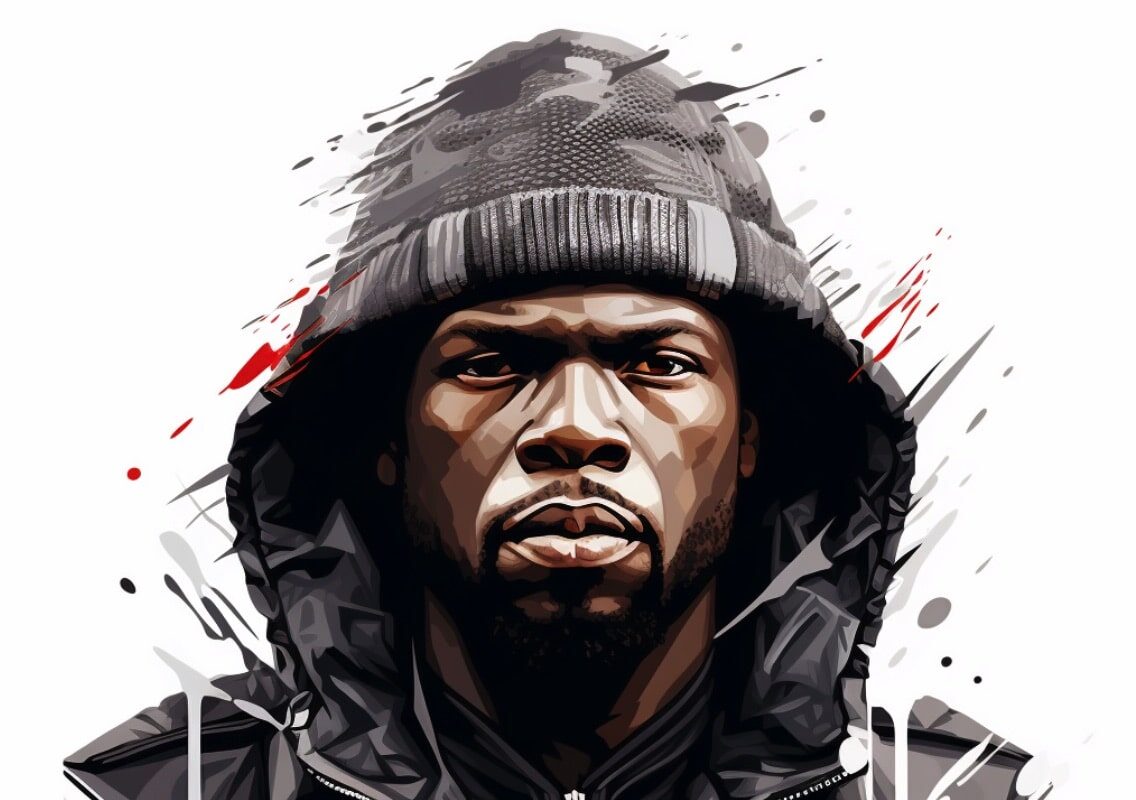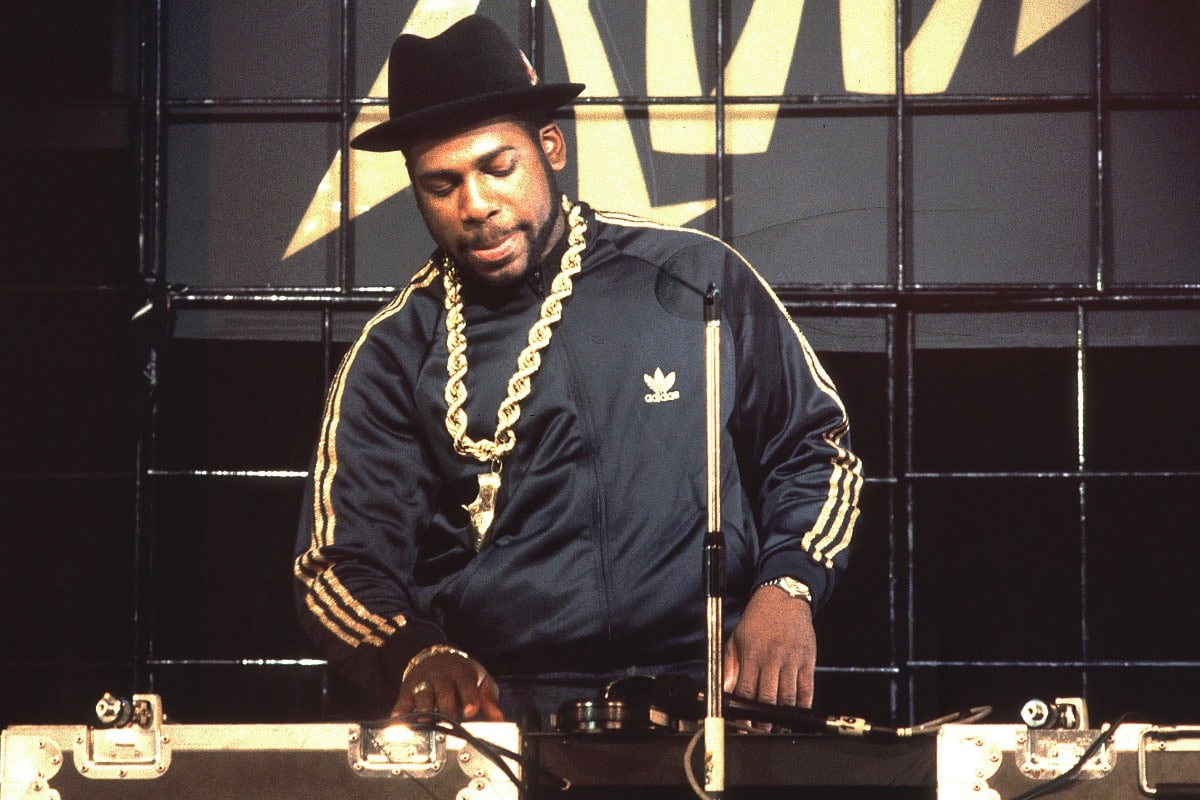If you’re talking about albums that shifted the hip-hop culture, you’ve got to throw a spotlight on 50 Cent’s “Get Rich or Die Tryin'”. That album, dropped in ’03, sent tremors through the scene, from the East Coast to the West, and its echoes are still ringing. It was more than just a collection of tracks, it was a bold declaration, a statement of intent, and it became the blueprint for gangsta rap in the new millennia. 50 Cent’s narrative – a hardscrabble rise from the South Jamaica Queens streets, surviving 9 shots, and a relentless hustle – became the very heartbeat of this seminal piece.
“Get Rich or Die Tryin'”, packed with 19 tracks, showcases 50’s knack for crafting irresistible hooks, unflinchingly visceral lyrics, and masterclass storytelling. With standout songs like “What up Gangsta”, “In Da Club”, “Many Men (Wish Death)”, and “P.I.M.P.”, the album paints raw images of the thug life, embedding itself into the very fabric of hip-hop culture and shaping its landscape. In a game often populated by pretenders, 50 Cent stood out with transparent authenticity, ensuring his words hit as hard as his beats.
As we dive into the intricate layers of this album, we’ll dissect the lyrical dexterity and narrative prowess that elevated 50 Cent from another street hustler to a hip-hop icon. So let’s get into it. From “Intro” to “P.I.M.P. – Snoop Dogg Remix”, here are the breaking down of the lyrics on “Get Rich Or Die Tryin'” by ’50 Cent’.
1 Intro
Spanning just under two minutes, the “Intro” portrays 50 Cent’s unapologetic detailing of his hustler lifestyle, punctuated by the pulsating rhythm of a heart beat adding a sense of menace and tension. Highlighting his struggle from a hooptie to a Benz, his narrative comes across as a prelude to the street chronicles that are yet to be unraveled in the subsequent tracks.
50 Cent speaks of real, palpable danger – gun threats, retaliation against perceived disrespect, and achieving power through illicit activities, demonstrating the grim reality of his past life in Queens. He underscores the sense of camaraderie and rivalry in his environment – the friends turned foes over money and power. This “Intro” does more than just open the album, it sets up 50’s universe, a bleak landscape of survival and ambition.
2 What Up Gangsta
This track serves as a report straight from the frontline, showcasing 50 Cent’s ability to stay cool in the face of adversity, his readiness to defend his turf and his hustle despite the odds stacked against him. With repeated, menacing hooks, “What up, Blood?” and “What up, Gangsta?”, he audaciously affirms his status in the streets and his allegiance to his set.
Deep down, the lyrics paint a vivid picture of a rugged, dog-eat-dog existence. From the chilling repercussions of crossing his path, to his anticipation of retaliation, all the way to his casual braggadocio about his criminal prowess, every line is a step further into the heart of the lion’s den. The song encapsulates the blend of bravado and dread that is characteristic of the gangsta lifestyle, with 50 Cent taking us on a guided tour into his world of survival and dominance.
3 Patiently Waiting
The song showcases 50 Cent’s hardened survivor spirit and resilience, as he navigates the harsh realities of street life, effortlessly weaving in themes of loyalty, vengeance and the hustle for power. Textured with gritty wordplay, the track serves as an urban chronicle, extrapolating 50 Cent’s struggle from the crime-infested Southside Queens to his ascension to hip-hop stardom. Eminem’s feature lays out a sobering narrative, reinforcing their underdog status and the shared hunger for success. All this is served over a haunting, ominous beat produced by Dr. Dre, framing their chilling tales in vivid sonic clarity. In essence, “Patiently Waiting” is a gritty ballad from the underbelly, a testament to their unwavering resilience amidst life’s harsh trials.
4 Many Men (Wish Death)
The track is 50’s somber meditation on mortality, betrayal, and survival. It’s laced with accounts of near-death experiences, referring to his infamous shooting incident that left him with nine bullets in his body, forever changing his voice. The lyrics paint a gritty picture of his life post-shooting, as he grapples with newfound fame, paranoia, and enemies – “many men”. The chorus echoes a chilling death wish, a testament to the potential lethal consequences of life in the streets. This autobiographical banger doesn’t shy away from grim themes, making it a haunting highlight in ‘Get Rich Or Die Tryin”.
5 In Da Club
From the opening call to party (“Go, shorty, it’s your birthday”), 50 establishes himself as the central figure, the man of the hour, dispensing bottles, attracting women, and embodying the playa lifestyle.
He peppers his verses with tales of resilience amidst street violence (“Been hit with a few shells, but I don’t walk with a limp”), aligning himself with the legendary hate-it-or-love-it image of Tupac. This isn’t just about his omnipresence in the club scene, it’s about his impact on the rap game, insisting he’s set to put it in a “chokehold”.
By the end of the song, he addresses his ascension (“My flow, my show brought me the dough”) and shrugs off any naysayers with a toast to the good life. It’s a track that encapsulates 50 Cent’s rise and ambition, all set to a pulsating club-ready beat.
6 High All The Time
Here, 50 Cent isn’t just “high all the time” for fun, he’s in a constant battle with his traumatic past and harsh reality. His life on the gritty streets of Southside Queens, his near-death experience, they all hang heavy in the backdrop of this track. As aptly put in the song, his conflicts aren’t temporary, he’s engaged in a lifelong fight “until my heart stop”. Lyrics to this track reveal more than just a rapper’s penchant for recreational drugs, they hint at the complexity and depth of 50 Cent’s persona, expressing the pain of his experiences and his relentless spirit to rise above them. It’s a communion of thug life, existential angst, and proof of the merciless upbringing of the hip-hop icon that is 50 Cent.
7 Heat
His vivid storytelling reveals life-threatening situations drawn from his personal experiences. The lyrics drip with the dread of ambush and retaliation, a coded language of survival found in the underbelly of society. He sheds light on gangsters questioning faith when faced with imminent death, triggering reflective moments amidst gritty verses. Despite the violent ethos, he hints at his vulnerability, directly contrasting his bravado with lyrics indicating he feels safer with bulletproof features. Interestingly, by proclaiming he’s unafraid of the legal consequences of his actions, Fif wrestles with the ethical boundaries often blurred in urban environments. “Heat” paints a compelling picture of 50 Cent’s resilience and his unabashed acceptance of the perilous hustler’s lifestyle he led before transitioning into the rap-game, revolutionizing hip-hop in the process.
8 If I Can’t
The track sees him spitting rhymes about his journey from the grimy streets of Southside Jamaica, Queens to the top of the game. He’s on his grind, determined to shine regardless of the obstacles thrown his way. As he proclaims, this success is God’s plan, not his own. He has no time for slow learners or those suffocating on his success; he’s too busy popping champagne and making it hot. This is a defiant anthem, a wolfish statement of self-assured dominance and unwavering persistence.
Central to the song are themes of resilience and defiance. He’s not afraid to play dirty if that’s the game’s rule, demonstrating a clear do-or-die mentality. The lyrics paint a picture of violence, chains, and grandmas, juxtaposing the gritty life 50 once knew with the luxurious one he’s running towards. “If I Can’t” is a testament to victory despite the odds, underscoring 50 Cent’s ascent and his unrelenting determination to remain on top.
9 Blood Hound
Throughout this cut, 50 manifests as the consummate hustler, slanging ‘caine relentlessly – rain or shine, he’s all about his grind. ‘Love to pump crack, love to stay strapped’ became a refrain that captured the gritty life he professed to live.
The lyrics drip with the ominousness of street life, as 50 warns potential foes of the danger he embodies, ready to ‘start bringing them thangs out.’ The narrative also reveals a powerful resilience, even defiance, in the face of hate and potential odds. Lyrically, “Blood Hound” manifests the fearlessness 50 Cent embodies, a key chapter in the story of a man who rose from street corners to hip-hop stardom.
The refrain, ‘I love to pump crack, love to stay strapped / Love to squeeze gats, but you don’t hear me though,’ as an audacious statement of defiance, punctuates the intensity that permeates his reiteration of street identity. “Blood Hound” is a testament to 50’s authenticity, a characteristic central to his enduring appeal in the genre.
10 Back Down
Far from a laid-back hype song, “Back Down” is an intense diss track aimed squarely at rapper Ja Rule and his crew. Cent’s lyrics are brimming with scathing remarks about credibility and authenticity, not just in the rap game, but in the raw, unvarnished world of the streets that both rappers hail from.
The song sees 50 Cent holding his ground, asserting he won’t back down in the face of enemies. He reaffirms his dangerous persona and his readiness to fight. The track is replete with detailed accounts of street violence, a theme that courses through the veins of this album. Moreover, the lyrics imply that he considers the level of respect one commands in the hood as the ultimate measure of a rapper’s worth, not their commercial success or fancy bling. Cent’s disdain for fake bravado is clear, showing that his own reputation has been hard-earned through real-life struggles.
11 P.I.M.P.
The track embodies 50’s raw street essence, portraying him as a ruthless hustler entirely committed to the cold calculus of the game. Opposed to the typical ‘sugar daddy’ portrayal, 50 introduces himself as a no-nonsense player ensuring every dalliance turns profitable, insisting “a bitch can’t get a dollar out of me”.
More than just a celebration of opulence or luxury, the song dives deep into the gritty realities of street life, where value is drawn from respect and game. His disinterest in frivolous pleasures is clear – he’s not after physical intimacy but pure, economic gain. Unfazed by a woman’s performance in bed, 50 is all about his bread. He paints himself as a seasoned player, guiding his women with the savvy of a friend, father, and confidant, pointing to the blurred lines between love, power, and commerce in the game.
12 Like My Style
The track sees 50 Cent confidently boasting about his style, his hustler’s mindset and his street credibility. He unapologetically reveals his imperfections, his propensity for danger and his tumultuous relationship with the law, serving as a reflection of his tumultuous background.
The lyrics allude to his life in the streets, dealing with the trappings of the trade, weaving this narrative with his allure to women. His willingness to reveal his past creates an honest and captivating picture that successfully resonates with his audience. The underlying message is clear: he’s a self-made success who won’t forget where he’s come from. Despite the superficial braggadocio, the lyrics also delve into societal commentary, subtly highlighting the tension between success and survival in a society that often devalues individuals from disadvantaged backgrounds.
13 Poor Lil Rich
The lyrics demonstrate 50’s rise to affluence from a life of poverty, where his newfound wealth acts as a playground for his brash personality. Dialogue takes over from simple conversation, as his jewelry, car and gun boast of his affluence, a stark contrast to his deprived past.
While “Poor Lil Rich” recounts 50’s journey from hardship to prosperity, it doesn’t shy away from the harsh realities of his past. The lyrics are an assertion of his dominance in the game, noting his release from prison and his unwillingness to soften for the mainstream. His muscular flow highlights experiences that hardened him, underscored by a fierce proclamation of his accomplishments. This track personifies the gritty, relentless ethos that fuels the narrative of “Get Rich Or Die Tryin’.”
14 21 Questions
Rather than flexing street credibility or flaunting wealth, Fifty questions the loyalty and genuine affection of his love interest. He poses deeply personal and contemplative questions about the longevity of love in the face of adversity, including hardships such as incarceration, financial instability, and his own potential unfaithfulness. It’s a raw and vulnerable side of 50 that peeps through the toughened G-Unit exterior, embodying the spirit of a street-savvy poet rather than a conventional gangster rapper. This song takes a detour from the thug-centric narratives common in the album, towards a more introspective journey impacting the listener on an emotional level. Right there, Fifty proved he’s not just about the bulletproof vests and the beef, but he’s also got a heart beating under there.
15 Don’t Push Me
This cut from ‘Get Rich or Die Tryin” showcases 50’s talent for layering his menacing persona with raw vulnerability. He adopts a confrontational stance, making it crystal clear that he’s on edge and unwilling to be tested. But beneath this tough exterior, his lyrics reveal a man teetering on the precipice, constantly grappling with his precarious lifestyle. Em and Lloyd Banks add to this vibe, their verses echoing the struggle and strife that come with the game. Just like the rest of the album, this song is a snapshot of 50’s life on the streets, putting you right in the middle of the grit and grime. It’s real, it’s edgy, and it’s quintessentially 50.
16 Gotta Make It To Heaven
50 grapples with the harsh realities of life in the hood, with references to friends who’ve been killed, the fear of betrayal, and the constant threat of violence that haunts the street hustle. The line “you know me, I stay with a bitch on her knees / And give guns away in the hood like it’s government cheese” reflects the callousness born of survival, alternating between sexual exploits and the brutal reality of gun distribution. The refrain “I gotta make it to Heaven for going through Hell” serves as an ongoing plea for redemption, a stark contrast to the violent, chaotic life he depicts. Additionally, the narrative sees 50 engaging with an explicit spirituality, tying raw street stories to a broader existential crisis, a hallmark of his lyrical prowess.
17 Wanksta
The composition is a bold call-out to all the ‘wankstas,’ a term coined by 50 Cent to define individuals who posture as gangsters without having experienced the real grit of street life, essentially posers. The lyrical brilliance lies not only in the taunting disdain he shows for these fake gangsters, but also in how he uses the narrative to establish his authenticity.
Throughout the song, the rapper details his own experiences that reinforce his realness, contrasting it with the lifestyle of the so-called wankstas. He speaks of his hustler mentality, unveiling the uncompromising rigor of street life. He challenges the authenticity of those who claim to be gangsters but have never made any substantial moves. ‘Wanksta’ unveils a segment of 50 Cent’s world, whilst challenging the listener to question who is truly genuine in the game.
18 U Not Like Me
The lyrics are a canvas painted with visceral flashes of NYPD altercations, unsettling neighbourhood encounters, and the looming paranoia of retaliation. Yet, 50’s narration doesn’t succumb to victimhood; instead, it thrives on defiant machismo, challenging anyone daring to undermine his hard-earned street credentials.
While some rappers opt for metaphorical wordplay, 50 Cent, in this track, offers a gritty, bullet-riddled realism that defies any romanticized gansta rap narratives. He flips the script, redefining ‘snitching’ and turning societal norms on their head. He points out the dysfunctional reality where violence isn’t just a consequence, but rather a necessity for survival.
At its core, “U Not Like Me” serves as a rugged anthem for those embroiled in the struggle, articulating a truth that doesn’t ask for sympathy or understanding. It’s a raw testament to 50’s resilience, both as a man and an artist, sealing his status as one of the realest to ever touch the mic.
19 Lifes On The Line
Leveraging his past life experiences and credibility, dissing his haters and making it clear he’s not to be trifled with. Driven by paranoia and resolve, 50 bares his cynicism noting that “nobody likes him,” and he’s completely okay with it because the feeling is mutual.
He embodies the essence of the grimy New York underworld, asserting his status as a ruthless survivor who’s been through the worst and come out on top. The lyrics depict the reality of the narcotics trade, from fluctuating commodities prices to police raids and territorial disputes. 50 Cent weaves a story of a hardened man unwilling to back down, fully embracing his reputation as a threat to be reckoned with. This track is all about domination and defiance, with 50 declaring his immunity to the consequences of his actions, a testament to his resilience amidst adversity.
20 P.I.M.P. – Snoop Dogg Remix
A masterstroke track that lays bare the hardened street hustle that defined his life before breaking through musically. Using PIMP as an acronym, 50 Cent establishes himself as a calculated entity, untouched by emotional sway. Instead, money is his only interest. Throughout the track, 50 Cent and the Doggfather navigate the grimy underworld, where Gucci, Fendi, and Prada represent ambition, but steady bread is the real prize.
The remix features West Coast legend Snoop Dogg adding his unique flair, turning the track into a bicoastal celebration. Snoop weaves his distinct C-R-I-P identity into the narrative, providing a contrast to 50’s gritty New York ethos. With his laid-back cadence, Snoop serves up his version of the hustle, highlighting his classic pimp persona. Yet, they both reaffirm the same message – ain’t no love, it’s all about the dough.









